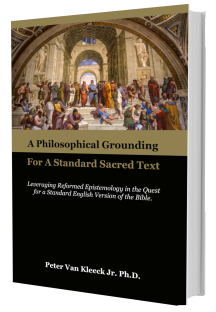Notes for WM 217:
I’m just getting back in the groove after a recent trip to
London where I was honored to speak in the “Day of Special Studies” for the
School of Theology at the Metropolitan Tabernacle Church, where on Saturday,
November 27, 2021 I gave three lectures on the theme “The War Against An
Authentic Biblical Text,” which are now posted to my WM channel (find
links here).
While still in England, I was made aware of a
blog post that appeared on the Evangelical Textual Criticism blog on
December 1, 2021, which offered a critique of a statement, taken out of context,
from a recent podcast interview I had done with Dwayne Green.
In this episode I want to offer a rejoinder to this blog post
and what I believe are its misrepresentations regarding my point on the unity
of the readings found in the classic printed Protestant editions of the TR.
Background:
Here is a bit of the background: I did an interview via Zoom with
Dwayne Green, a Pentecostal Pastor from Canada, back on November 11, 2021. I
think we spoke for nearly two hours.
He then took the video material, edited it (according to the
sometimes jumpy and humorous style he uses in his blogcast), and he released
the interview in three segments over several days.
The third of those videos was posted on November 29, 2021 and
was titled “Which TR does the Traditional Text Use?”
Just two days after the release of that third video (December
1, 2021), Elijah Hixson, associate pastor of the Fireside Fellowship Church in
Kingston, TN, posted
a “longish post” (as he put it) on the Evangelical Textual Criticism blog,
responding to a statement, taken out of context, which I had made in that video
with respect to the so-called “Which TR?” objection.
His post was titled, “On the Comma Johanneum, ‘Which TR?’ and
working from inadequate data.”
Some general things I found interesting about Hixson’s post:
There were a couple of rather interesting things overall about
Pastor Hixson’s post.
First, Pastor Hixson begins by telling his readers that he
did this post “only because I care about data and getting it right.” He provides
a link to the podcast interview, but he only cites one statement from me in the
written article (and even that was not cited as a direct quotation), out of
context, and, oddly enough, never bothers directly to mention my name or to
offer any analysis for the background for the conversation.
This reminds me of the way a certain Popular Internet
Apologist (PIA) used to respond to my material on his podcast. Yes, I get the
irony of the fact that I did not mention the PIA’s name in the previous
sentence.
Wouldn’t it make sense for someone who wants to “get the data
right” to be clear about whose work he’s critiquing?
Pastor Hixson also makes an odd reference later to another
anonymous “TR Advocate” whom he accuses of committing a supposed logical
fallacy (the “True Scotsman”) argument. This may also be a reference to yours
truly, but I’m not sure, because Pastor Hixson provides no name, reference, or
context for this charge.
My sense is that by this comment Pastor Hixson may be attempting
to respond preemptively to the objection he knows I will raise against his misrepresentation
of my quoted statement. Namely, he knows that that my statement was with
respect to all the classic, mature, Protestant printed editions, that they
contain Matthew 6:13b, Mark 16:9-20, John 7:53—8:11, Acts 8:37, and 1 John
5:7b-8a—but more on this later.
Second, those in the TR community are well familiar with
Pastor Hixson and his frequent offers of online “help,” because he only cares
“about the data and getting it right.” I
remember a conversation I had with one TR advocate a few years ago who noted
that Pastor Hixson seems to be a ubiquitous presence on all social media sites
dedicated to textual criticism and he’s often quick to offer his brand of neutral “corrections” to anyone promoting
the traditional text. Yes, he is quite a disinterested and objective observer
of these things.
Third, it is interesting that Pastor Hixson is apparently now
listening to video and audio podcasts (given that he linked the video interview
with Dwayne Green and made this “longish post” on my comments, taken out of
context, from it). This is interesting, because in past online interactions
with Pastor Hixson, when I suggested he listen to my WM podcast to understand
statements I had made in context, he responded that he always preferred written
content and never listened to podcasts or watched online videos, because he
found these hard to engage his restless and active mind. I guess his opinion and
practices on podcasts and videos has changed.
Now, let’s get down to the nitty gritty of his objections,
and you can judge for yourself whether he “got the data right.”
What was my contested statement?
So, what was the one statement from the roughly two hours of
conversation that I had with Dwayne Green to which Pastor Hixson takes
exception in his article. It was this one, which I will try to cite verbatim
from the recording:
“All of those printed editions of the TR included Mark
16:9-20; all of them included John 7:53—8:11; all of them included the doxology
of the Lord’s Prayer (Matthew 6:13b); all of them included the Ethiopian eunuch’s
confession in Acts 8:37; all of them included the Comma Johanneum (1 John
5:7-8), so the differences between them are relatively minor….”
What was Hixson’s assessment?
Pastor Hixson declares, “that statement simply is not true.”
He then proceeded to cite several early printed editions
of the Greek NT that do not include the doxology of Matthew 6:13b (the Complutensian
Polyglot), the Ethiopian eunuch’s confession (the Complutensian Polyglot), or
the CJ (Erasmus’ first two editions [1516, 1519], the Aldine [1518], Gerbellius’
edition [1521], Köpfel’s edition [1524], and Colinaeus’
edition [1534]).
He also makes a reference to the fact that the CJ did not
appear in the first edition of Luther’s German NT, since he followed the second
edition of Erasmus (1519), and to the fact that the CJ appears in “brackets in
smaller type” in an English translation, the Matthew’s Bible (1537).
The flaw in Hixson’s critique:
The basic flaw in Pastor Hixson’s critique of my statement is
his assumption of what I meant by “the printed editions of the TR.”
Granted, I should also have been clearer and will try to do
so in the future to avoid any confusion.
By “printed editions of the TR” I was not referring to all
early printed editions of the Greek NT, but specifically to the classic,
mature, Protestant printed editions of the TR, which served as the basis
for the Protestant vernacular translations of the Reformation and Post-Reformation
(Protestant Orthodox) eras.
Another anonymous charge Pastor Hixson levels in his article
is: “Instead of dealing with that question [the ‘Which TR’ objection], some TR
defenders seem to brush it off as irrelevant.”
I’m not sure if he counts me among this anonymous group of “some
TR defenders.”
I did post a
blog article on the topic back in 2019 in response to a “Which TR?”
critique offered by Dirk Jongkind, and I have continued to expand on and
clarify that response in various contexts.
My friend Vince Krivda has also written an extended article
on the topic, titled, “Which
TR?! A Response to Mark Ward’s Critique of Confessional Bibliology.” I’m
sure Pastor Hixson would want to “get the data right” by acknowledging these
responses.
In my aforementioned blogpost, I have tried to offer a confessional
response to the “Which TR?” objection and to clarify what I mean when I appeal
to the printed editions of the TR. Here’s an excerpt from the post as it
currently stands:
First, it is important to point out that there is no single
“perfect” printed edition of the TR. This does not mean, however, that the
various printed editions of the TR taken collectively fail to provide for us a
reasonable and reliable witness to the received text.
At the Text and Canon Conference Jonathan Arnold made mention of
the TBS’s helpful “Statement of Doctrine of Holy Scripture” which,
for the NT, refers to the received text as “a group of printed texts” adding
that “the scope of the Society’s Constitution does not extend to considering
the minor variations between the printed editions of the Textus Receptus.”
Second, we should not let the fact that such minor variations
exist among the various printed editions of the TR overshadow the fact that
those editions are overwhelmingly uniform and, particularly so, with regard to
those places where there are major differences with the modern critical text.
All the classic Protestant printed editions of the TR, for example, include the
doxology of the Lord’s Prayer (Matt 6:13b), the traditional ending of Mark,
“the only begotten Son” at John 1:18, the PA, Acts 8:37, “God was manifest in
the flesh” at 1 Timothy 3:16, the CJ, etc.
As for the remaining minor variations, each of these, should be
evaluated on a case by case basis. If this is done, I believe that
most of them will be easily resolved, while only a few will call for more
careful deliberation.
I later added:
The editions which should be primarily consulted
are the classic Protestant ones of Stephanus and Beza, based on Erasmus'
foundational work. The Elzevir editions should also be consulted, but with the
understanding that they appeared after most of the translations of the TR had
first been made into the modern languages of Europe.
Given this context, it should be clear that when I made
reference to “all the printed editions of the TR” including the various
passages mentioned, I was not speaking about every early printed editions of
the Greek NT, but the classic, mature, Protestant printed editions of
the TR, as epitomized in those of Stephanus, Beza, and, later, the Elzevirs.
Let me briefly review the six early printed editions of
the Greek NT, which Pastor Hixson cites:
First: The Complutensian Polyglot was a RC edition of the
Greek NT, produced in Spain under the authority of Cardinal Ximenes. It is
hardly surprising then that, following the Latin Vulgate, it did not include
Matthew 6:13b.
Second: The Aldine edition was also produced in a RC context
in Venice in 1518. Luther did not appear before the Diet of Worms until 1521.
It is not a Protestant printed edition of the TR. In addition, its NT followed
the first edition of Erasmus, so it is not an independent witness for the
omission of the CJ.
Third: Pastor Hixson also cites the omission of the CJ from
the first two editions of Erasmus (1516, 1519). Erasmus’ Greek NT was indeed foundational
for the TR, but it was not a Protestant printed edition either. We should also
note that the CJ was included in Erasmus’ third, fourth, and fifth editions (1522,
1527, 1536). The standard for Erasmus’s printed Greek NT should not be the first
two which he later corrected, but the final, corrected, and complete editions,
as affirmed by the Protestant orthodox.
Given his stated emphatic desire, to “get the data right,” surely
Pastor Hixson would not suggest that I did not know that the Erasmus’ first and
second printed editions of the Greek NT omitted the CJ. After all, I published
a scholarly article in 2017 in the PRJ titled “Erasmus
Anecdotes” which discussed extensively the “rash wager” legend related to
the CJ’s inclusion in the third edition of his Greek NT.
Fourth:
As I understand it, Gerbellius was a humanist and not a full-throated Protestant.
My guess is that his edition (1521) was based on the earlier editions of Erasmus,
so it is not an independent example of the omission of the CJ.
Fifth:
Köpfel’s edition (1524) would have appeared in the early
stages of the Reformation, so it was not a mature Protestant edition. I also assume
that like the Gerbellius edition it was likely based on one or both of the first
two editions of Erasmus.
I might add here that Pastor Hixson mentions
Luther’s omission of the CJ in first edition of his German NT, but he concedes
that it was later added to the German Bible, as indeed this reflected the
Protestant consensus.
Sixth: The Colinaeus edition (1534) also could
not possibly be classified as a mature Protestant edition of the TR. This is
another case where I am sure that Pastor Hixon in his zeal to “get the data
right” would not want to overlook the fact that I published a 2017 academic
article, also in the PRJ, titled “John
Calvin and Text Criticism” in which I noted Calvin’s distinct transition from
using the Greek text of Colinaeus in his commentaries and the writings of his
early ministry to making use of the printed TR of Stephanus in this mature
ministry. In my article, I lean heavily on the research of renowned Calvin
scholar T. H. L. Parker, who notes that Colinaeus’ NT was astonishingly “modern”
(see p. 135 in my article) and suggests Calvin made the transition under the
influence of Stephanus. Perhaps Pastor Hixson would accuse Parker of committing
the “True Scotsman” fallacy by concluding that Colinaeus’ Greek NT was not a “true”
Protestant TR!
Conclusion:
In conclusion, the fatal flaw in Pastor Hixson’s
critique of my statement, taken out of context from a podcast conversation, was
his failure to draw a distinction between the early printed editions of the Greek
NT and the classic, mature Protestant editions of the TR. My statement referred
to the latter and not the former.
Pastor Hixson gives great weight in his argument
to a 1999 QR article by G. W. and D. E. Anderson, which also appears on
the TBS website, and which offers a broad survey of the printed editions of the
Greek NT and does indeed describe them in the broadest sense as “editions of
the Textus Receptus.” Pastor Hixson does not, however, give proper attention to
the focus given by the Andersons at the conclusion of this article to the later
mature editions of the TR, produced by Stephanus and Beza, and especially to Scrivener’s
edition (1894), still kept in print by the TBS, as a standard representation of
the TR. Clearly, the authors of the article give greater weight to the later
Protestant editions of the TR, as opposed to earlier printed editions of the Greek
NT, which served as forerunners to it.
The Anderson article, in fact, makes the point that the term “Textus
Receptus” was not coined until the second edition of the Elzevirs in 1633.
It would be a gross misrepresentation of the Anderson
article to suggest that either the Andersons or the TBS would endorse as
legitimate any printed edition of the Greek NT that omitted Matthew 6:13b, Mark
16:9-20, John 7:53—8:11, Acts 8:37, or 1 John 5:7-8.
In the end, it is interesting to consider that even without
making a distinction between the earlier printed editions of the Greek NT and
the later classic Protestant editions of the TR, Hixson could find so few differences
among them. Even among the earliest printed editions of the Greek NT, he could
cite none that excluded the traditional ending of Mark or the PA, only one that
omitted the doxology of the Lord’s Prayer and the Ethiopian Eunuch’s confession
(the Complutensian), and only a handful that omitted the most controversial CJ
(and all those are most likely based on the first two editions of Erasmus,
later corrected by Erasmus himself).
Pastor Hixson’s study, oddly enough, actually demonstrates
how relatively uniform the printed editions of the Greek NT (whether early printed
editions or the mature Protestant TR editions) were until the nineteenth
century.
Pastor
Hixson essentially concedes as much toward the end of his post when he states, “At the end of the day, one could argue that there was eventually a consensus and
that these examples don’t actually matter.”
What he claims to take issue with is the assertion
“that TRs all agree in these ‘major’ passages, and they only
disagree in ‘minor’ places.”
He pronounces, “That claim is demonstrably
untrue—there’s just no way around it.”
Again, the problem is with Pastor Hixson’s misrepresentation
of what I meant by “printed editions of the TR.” I did not mean the Complutensian,
the first two editions of Erasmus, and Colinaeus. I meant the mature Protestant
editions of the TR produced by the Protestant orthodox, like Stephanus and
Beza. In fact, they do share a consensus on the text. They do agree in the
major passages, and generally only have minor differences. This claim is not
untrue, and there is just no way around it.
Let me deal finally with what I found to perhaps
the most interesting statement from Pastor Hixson at the end of the post. He states,
“If somebody wants to use a particular edition because textual criticism is
hard and they have a hard time evaluating modern text-critical claims but they
trust they will be safe if they use an edition that God has used for
a few hundred years, I have absolutely no problem with that.”
Pastor Hixson is essentially saying that if you
hold to the TR (“a particular edition”), you do so for three reasons:
First, “because textual criticism is hard.” In
other words, you hold to the TR, because you’re lazy.
Second, because “they have a hard time
evaluating modern text-critical claims.” In other words, you hold to the TR because
you’re dim-witted.
Third, because “they trust they will be safe
if they use an edition that God has used for a few hundred years.” In other
words, if you hold to the TR, it is because you are insecure. Notice also that
the traditional text, according to Pastor Hixson, has only been used by God “for
a few hundred years.” So, God apparently used another text (or texts) before the
TR, he used the TR for a couple hundred years, and now he’s moved on to yet
another text. If you think that God will preserve the Word and keep it pure in
all ages, it’s because you suffer from emotional insecurity.
And the last part: If you are clinging to the
wrong Bible, Pastor Hixon has “absolutely no problem with that.” His only concern
is that you “get the data right.”
So, to sum up, if you hold to the TR, you’re
lazy, dim-witted, and insecure. But if you don’t want to open your eyes, Pastor
Hixson is fine with you living in the dark.
Thank goodness we have people like Pastor Hixon
defending the modern text against those uncharitable and unenlightened “TR-Onlyists.”
I think everyone listening will join with me in
thanking Pastor Hixson for condescending to share his insights with us, to help
us “get the data right.”
JTR





















